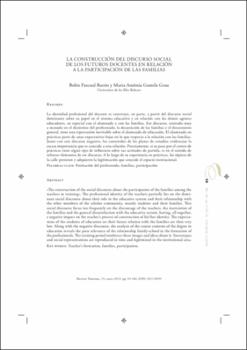La construcción del discurso social de los futuros docentes en relación a la participación de las familias/
Date
2012Abstract
La identidad profesional del docente se construye, en parte, a partir del discurso social
dominante sobre su papel en el sistema educativo y en relación con los demás agentes
educadores, en especial con el alumnado y con las familias. Ese discurso, centrado muy
a menudo en el desánimo del profesorado, la desatención de las familias y el descontento
general, tiene una repercusión inevitable sobre el alumnado de educación. El alumnado en
prácticas parte de unas expectativas bajas en lo que respecta a la relación con las familias.
Junto con este discurso negativo, los contenidos de los planes de estudios evidencian la
escasa importancia que se concede a esta relación. Precisamente, si su paso por el centro de
prácticas tiene algún tipo de infl uencia sobre sus actitudes de partida, es en el sentido de
reforzar elementos de ese discurso. A lo largo de su experiencia en prácticas, los tópicos de
la calle persisten y adquieren la legitimación que concede el espacio institucional. Th e professional identity of the teachers partially lies on the dominant
social discourse about their role in the educative system and their relationship with
the other members of the scholar community, mainly students and their families. Th is
social discourse focus too frequently on the discourage of the teachers, the inattention of
the families and the general dissatisfaction with the educative system, having, all together,
a negative impact on the teacher’s process of construction of his/her identity. Th e expectations
of the students of education on their future relation with the families are then very
low. Along with the negative discourse, the analysis of the course contents of the degree in
education reveals the poor relevance of the relationship family-school in the formation of
the professionals. Th e training period reinforces these images and ideas about it. Stereotypes
and social representations are reproduced in time and legitimised in the institutional area.





